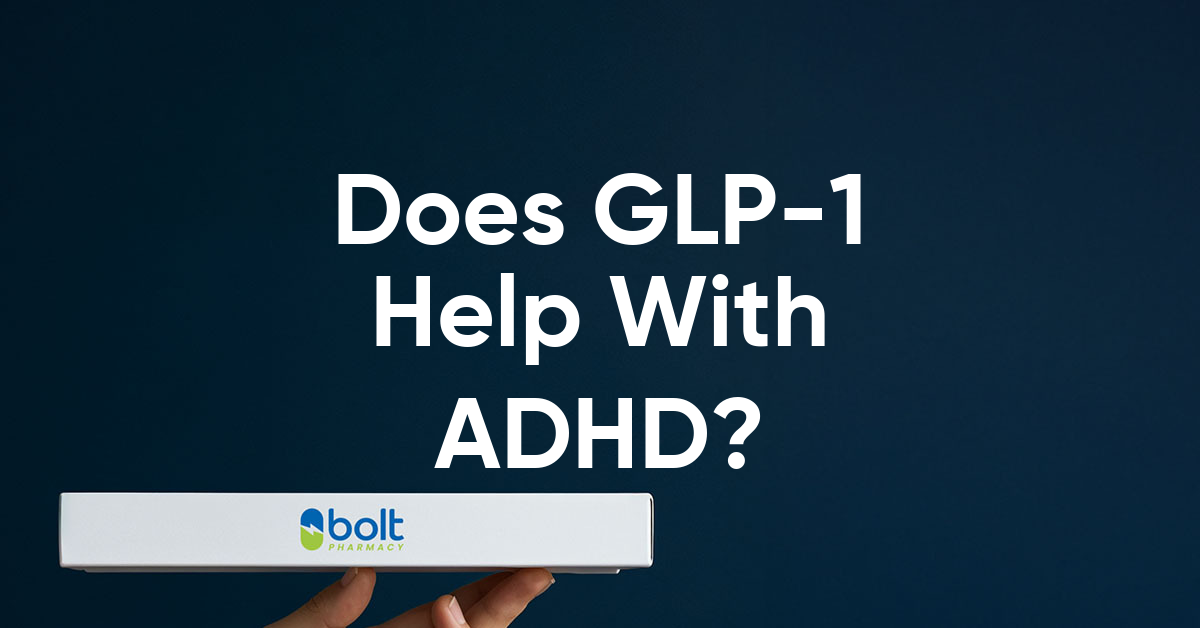Glucagon-like peptide-1 (GLP-1) receptor agonists, such as semaglutide and liraglutide, are licensed in the UK for type 2 diabetes and weight management. Recently, interest has emerged regarding whether GLP-1 medications might help with attention deficit hyperactivity disorder (ADHD) symptoms, given that GLP-1 receptors are present in brain regions involved in attention and impulse control. However, these medications are not licensed by the MHRA or recommended by NICE for ADHD treatment. This article examines the current evidence, explores the biological mechanisms, and clarifies what patients should know about evidence-based ADHD management in the UK.
Summary: GLP-1 receptor agonists are not licensed or recommended for ADHD treatment in the UK, and no robust clinical evidence supports their use for ADHD symptoms.
- GLP-1 medications (semaglutide, liraglutide) are licensed only for type 2 diabetes and weight management, not ADHD.
- GLP-1 receptors exist in brain regions involved in attention and impulse control, but this does not establish clinical efficacy for ADHD.
- No randomised controlled trials have investigated GLP-1 receptor agonists specifically for ADHD treatment.
- NICE guidelines (NG87) recommend methylphenidate, lisdexamfetamine, atomoxetine, or guanfacine as evidence-based ADHD treatments.
- GLP-1 medications carry risks including gastrointestinal symptoms, pancreatitis, and gallbladder disease, requiring specialist supervision.
- Patients experiencing ADHD symptoms should consult their GP for referral to specialist ADHD services for evidence-based assessment and treatment.
Table of Contents
What Are GLP-1 Medications and How Do They Work?
Glucagon-like peptide-1 (GLP-1) receptor agonists are a class of medications primarily licensed for the treatment of type 2 diabetes mellitus and, in specific formulations, for weight management. In the UK, commonly prescribed GLP-1 medications include semaglutide (Ozempic for diabetes, Wegovy for weight management), liraglutide (Victoza for diabetes, Saxenda for weight management), and dulaglutide (Trulicity for diabetes only). These medicines are administered via subcutaneous injection, typically once weekly or once daily depending on the specific formulation. Oral semaglutide (Rybelsus) is also available for type 2 diabetes.
GLP-1 is a naturally occurring incretin hormone released by the intestines in response to food intake. The mechanism of action involves binding to GLP-1 receptors located throughout the body, including the pancreas, gastrointestinal tract, and importantly, the brain. In the pancreas, GLP-1 receptor activation stimulates insulin secretion in a glucose-dependent manner, meaning insulin is only released when blood glucose levels are elevated. This reduces the risk of hypoglycaemia compared with some other diabetes medications.
Additionally, GLP-1 receptor agonists slow gastric emptying, which prolongs the feeling of fullness after eating, and they act on appetite centres in the hypothalamus to reduce hunger and food intake. These combined effects lead to improved glycaemic control and significant weight loss in many patients. The MHRA has approved these medications for specific indications, and NICE guidelines recommend their use in adults with type 2 diabetes who meet certain criteria (NG28). For weight management, NICE recommends semaglutide 2.4mg (Wegovy) for adults with a BMI ≥35 kg/m² (or ≥30 kg/m² with weight-related comorbidities) within specialist weight management services alongside lifestyle interventions (TA875). Liraglutide 3mg (Saxenda) has more restricted criteria, requiring prediabetes or high cardiovascular risk (TA664). Both weight management treatments are time-limited and require specialist supervision.

The Link Between GLP-1 Receptors and Brain Function
GLP-1 receptors are not confined to peripheral tissues—they are also widely distributed throughout the central nervous system, including regions involved in cognition, reward processing, and executive function. These brain areas include the hippocampus, prefrontal cortex, striatum, and substantia nigra, which are all implicated in attention, impulse control, and motivation—functions that are often impaired in attention deficit hyperactivity disorder (ADHD).
Preclinical research in animal models has demonstrated that GLP-1 receptor activation may influence dopaminergic and noradrenergic neurotransmission, the same pathways targeted by conventional ADHD medications such as methylphenidate and amphetamines. Dopamine plays a crucial role in reward, motivation, and attention regulation, whilst noradrenaline is involved in arousal and executive function. Some laboratory studies suggest that GLP-1 analogues may modulate these neurotransmitter systems, potentially affecting cognitive performance and impulsivity, though these findings remain largely preclinical.
Furthermore, GLP-1 has been shown to have neuroprotective properties, including anti-inflammatory effects and promotion of neuronal survival. Some research has explored GLP-1 receptor agonists in neurodegenerative conditions such as Parkinson's disease and Alzheimer's disease, with mixed early findings that cannot be generalised to ADHD. The mechanisms and clinical relevance of these effects in humans require further investigation.
However, it is important to emphasise that whilst the biological plausibility exists, there is no official link established between GLP-1 receptor agonists and ADHD treatment. The presence of GLP-1 receptors in relevant brain regions does not automatically translate into clinical efficacy for ADHD symptoms. These medications are not licensed by the MHRA or recommended by NICE for ADHD management, and much more research is needed to understand these potential connections.
Current Evidence on GLP-1 Medications for ADHD Symptoms
At present, there is no robust clinical evidence to support the use of GLP-1 receptor agonists for the treatment of ADHD symptoms. These medications are not licensed by the MHRA for ADHD, and they do not appear in NICE guidelines for ADHD management (NG87). The existing evidence base consists primarily of preclinical studies, small observational reports, and theoretical mechanisms rather than large-scale randomised controlled trials.
Some preliminary observational data have suggested that individuals with comorbid obesity and ADHD who were prescribed GLP-1 medications for weight management reported subjective improvements in attention and impulse control. However, these reports are anecdotal and confounded by multiple factors, including concurrent weight loss, improved metabolic health, and potential placebo effects. Weight loss itself can improve sleep quality, self-esteem, and overall wellbeing, all of which may indirectly influence ADHD symptoms.
A small number of mechanistic studies have explored the cognitive effects of GLP-1 analogues in other populations, such as individuals with type 2 diabetes or obesity. Some research has shown modest improvements in memory and executive function, but these findings have not been replicated specifically in people with ADHD. The heterogeneity of ADHD presentations and the complexity of its underlying neurobiology make it difficult to extrapolate findings from other conditions.
As of 2023, no published randomised controlled trials specifically investigate GLP-1 receptor agonists as a treatment for ADHD. Until such evidence emerges from well-designed studies, clinicians cannot recommend these medications for ADHD management. Patients should be aware that using GLP-1 medications off-licence for ADHD would not be supported by current evidence and could expose them to unnecessary risks and costs without proven benefit. Any off-label use would require specialist oversight and appropriate local governance arrangements.
ADHD Treatment Options Available in the UK
In the UK, NICE guidelines (NG87) provide comprehensive recommendations for the diagnosis and management of ADHD in children, young people, and adults. Treatment typically involves a combination of non-pharmacological and pharmacological interventions, tailored to the individual's age, symptom severity, and personal circumstances.
Non-pharmacological approaches form the foundation of ADHD management and include:
-
Psychoeducation for patients and families about ADHD, its impact, and management strategies
-
Environmental modifications such as structured routines, organisational aids, and minimising distractions
-
Cognitive behavioural therapy (CBT) to address comorbid anxiety, depression, or low self-esteem
-
Parent training programmes for children and adolescents with ADHD
-
Occupational therapy to develop practical coping strategies
Pharmacological treatment is recommended when ADHD symptoms cause significant impairment despite environmental modifications. First-line medications in the UK include:
-
Methylphenidate (e.g., Concerta XL, Equasym XL, Medikinet XL)—a stimulant that increases dopamine and noradrenaline availability
-
Lisdexamfetamine (Elvanse)—a prodrug stimulant for ADHD when significant impairment persists
-
Atomoxetine (Strattera)—a non-stimulant noradrenaline reuptake inhibitor, suitable when stimulants are contraindicated or ineffective
-
Guanfacine (Intuniv)—a non-stimulant alpha-2 adrenergic agonist licensed for children and adolescents aged 6-17 years
Medication choice depends on individual factors including comorbidities (such as anxiety, tics, or substance misuse history), cardiovascular health, and patient preference. Regular monitoring is essential, including baseline cardiovascular assessment, ongoing evaluation of symptom response, adverse effects, blood pressure, heart rate, and growth in children. NICE recommends annual medication reviews and consideration of drug holidays where appropriate. After stabilisation, shared-care arrangements with GPs may be established. Patients should always be under the care of a specialist ADHD service or a GP with expertise in ADHD management.
Safety Considerations and When to Speak with Your GP
If you are considering any medication for ADHD symptoms, including GLP-1 receptor agonists, it is essential to consult your GP or specialist before making any changes to your treatment. Self-medicating or using medications off-licence without medical supervision can be dangerous and is not supported by current evidence.
GLP-1 medications carry specific risks that patients should be aware of. Common adverse effects include:
-
Gastrointestinal symptoms—nausea, vomiting, diarrhoea, constipation, and abdominal pain (affecting up to 40% of users)
-
Reduced appetite and weight loss
-
Injection site reactions—redness, itching, or discomfort
-
Hypoglycaemia—particularly when used alongside insulin or sulfonylureas
More serious but rare adverse effects include pancreatitis (inflammation of the pancreas) and gallbladder disease. In non-clinical studies, rodent C-cell thyroid tumours were observed with some GLP-1 receptor agonists, though the relevance to humans remains uncertain. The MHRA advises that patients should seek immediate medical attention if they experience severe, persistent abdominal pain with or without vomiting, as these may be signs of pancreatitis.
GLP-1 medications should be avoided during pregnancy and breastfeeding. If you experience any suspected side effects, report them via the MHRA Yellow Card Scheme (yellowcard.mhra.gov.uk).
You should contact your GP if:
-
You are experiencing ADHD symptoms that significantly impact your daily functioning, work, or relationships
-
You have been diagnosed with ADHD but your current treatment is not adequately controlling symptoms
-
You are experiencing adverse effects from ADHD medications
-
You have read about GLP-1 medications and are considering them for ADHD—your GP can discuss evidence-based alternatives
-
You have comorbid conditions such as obesity or type 2 diabetes alongside ADHD and want to discuss comprehensive management
Evidence-based ADHD treatments have been extensively studied for safety and efficacy. Whilst research into novel treatments continues, patients should rely on licensed, guideline-recommended therapies under appropriate medical supervision. Your GP can refer you to specialist ADHD services if needed, ensuring you receive comprehensive assessment and evidence-based care tailored to your individual needs.
Frequently Asked Questions
Are GLP-1 medications approved for ADHD treatment in the UK?
No, GLP-1 receptor agonists are not licensed by the MHRA or recommended by NICE for ADHD treatment. They are approved only for type 2 diabetes and weight management in specific circumstances.
What are the evidence-based treatments for ADHD in the UK?
NICE guidelines (NG87) recommend methylphenidate, lisdexamfetamine, atomoxetine, and guanfacine as first-line pharmacological treatments for ADHD, alongside non-pharmacological approaches such as psychoeducation, CBT, and environmental modifications.
Should I speak to my GP if I'm interested in GLP-1 medications for ADHD?
Yes, you should always consult your GP before considering any medication for ADHD symptoms. Your GP can discuss evidence-based treatments and refer you to specialist ADHD services for comprehensive assessment and management.
The health-related content published on this site is based on credible scientific sources and is periodically reviewed to ensure accuracy and relevance. Although we aim to reflect the most current medical knowledge, the material is meant for general education and awareness only.
The information on this site is not a substitute for professional medical advice. For any health concerns, please speak with a qualified medical professional. By using this information, you acknowledge responsibility for any decisions made and understand we are not liable for any consequences that may result.
Heading 1
Heading 2
Heading 3
Heading 4
Heading 5
Heading 6
Lorem ipsum dolor sit amet, consectetur adipiscing elit, sed do eiusmod tempor incididunt ut labore et dolore magna aliqua. Ut enim ad minim veniam, quis nostrud exercitation ullamco laboris nisi ut aliquip ex ea commodo consequat. Duis aute irure dolor in reprehenderit in voluptate velit esse cillum dolore eu fugiat nulla pariatur.
Block quote
Ordered list
- Item 1
- Item 2
- Item 3
Unordered list
- Item A
- Item B
- Item C
Bold text
Emphasis
Superscript
Subscript












